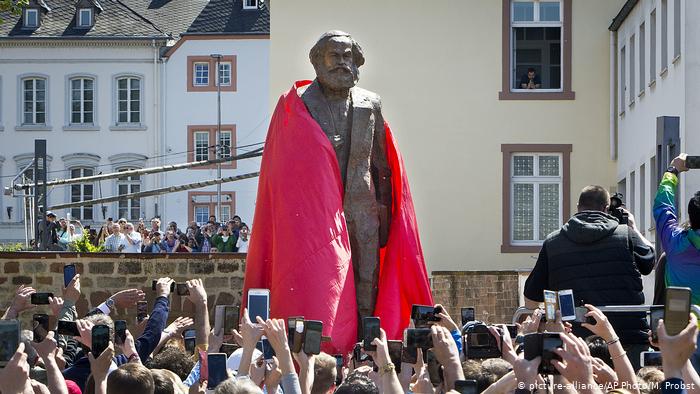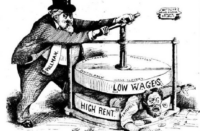Earlier this year there were attacks on Karl Marx’s grave in Highgate Cemetery in London. Around Europe since the fall of the Soviet Union there have been attempts to destroy or remove any statues or other monuments commemorating those who fought fascism during the Second World War, or previously in the International Brigades in Spain.
These attacks are part of a neo-liberal trend that seeks to reinterpret history and to denigrate Marxism and anything associated with it. In one part of Europe, however, Karl Marx is still honoured.
Karl Marx was born in Trier in 1818. He is the most famous person born there, and he features prominently in the local tourist industry.
An 18-foot (5.5 m) bronze statue of Marx sculpted by Wu Weishan and donated by China was unveiled in 2018. The statue was to commemorate Marx’s life and legacy two hundred years since his birth, and it looks outstanding. Originally it was intended to place it near the Karl Marx Museum, but, given its size, it was decided to place it in its present position near the Ponta Nigra, a bridge over the Moselle.
Marx grew up in this district, and this is also where the City Museum and tourist office are. Marx was born at the other end of town, where the Karl Marx Museum is housed. About 50,000 Chinese visitors—70 per cent of the visitors to the museum—visit Trier each year. On the day of the visit of two communists from Ireland we were told that comrades from Mongolia had also made the pilgrimage to Trier.
Trier itself is a fascinating place. It is the oldest city in Germany, founded by the Roman emperor Augustus. At the time of Marx’s birth the population was about 15,000; it is now over 114,000. There are numerous Roman structures, such as walls, baths, and Porta Nigra itself. These are the streets that Marx walked in the first seventeen years of his life. If he had not been influenced by his surroundings in this beautiful city he would have to be quite dense.
This is predominantly a wine-growing region, and this seems to have been the main source of employment, around which other trades developed in the town. Karl Marx tourism is now an important source of income for the local hotels and bars.
Another important aspect of Trier is that for the twenty years before 1815 Trier was part of France. This meant greater freedom of expression, other rights for citizens, and the influence of French rationalism. From 1815 Trier came under the control of Prussia. Marx’s father converted to Christianity in order to continue his occupation. For unknown reasons, he became a Protestant, though Trier was predominantly Catholic.
Marx went to the local school and was confirmed in Trier. The transfer from France to Prussian control had a profound and negative effect on Marx for his whole life.
The Karl Marx Museum is well worth a visit. It shows Marx’s development. Little is known about his early education; he was probably educated at home before going to school. When he left Trier to go to university his father had wanted him to become a lawyer. His doctoral dissertation, however, was on “The Difference Between the Democritean and Epicurean Philosophy of Nature.” He was also becoming involved in politics. Any criticism or even implied criticism of the state was deemed by the Prussians to be an attack. Marx was unable to find work in academia and had to turn his hand to journalism.
Despite moving to Paris, Brussels, and eventually London, the Prussians continued to hound him, either by influencing governments to expel him or by spying on him, as they did in London. In 1842 Marx wrote: “A censorship law is an impossibility because it seeks to punish not offences but opinions.”
The museum shows that for his whole life Karl Marx annotates, takes excerpts and provides a commentary on an incredible number of texts. In order to grasp the bigger picture he reads widely. He works meticulously and scientifically. He questions everything. He observes and studies everything: philosophy, law, economics, mathematics, biology, chemistry. He also communicates with a wide body of correspondents, especially with Engels. In this way he is constantly refining and developing his ideas.
The museum also shows his influence on subsequent communists, such as Lenin, Mao, Luxemburg, and others, down to our own day.
Karl Marx was one of the last great universal scholars. He was grounded in the traditions of French rationalism and Enlightenment thought, together with German idealism. He was much more than a mere intellectual: at various times in his life he engaged in struggle against the forces of oppression. He could have followed an academic career and kowtowed to the Prussian authorities; instead he chose to fight for the underprivileged, and in the course of his life he forged a weapon for the working class to fight capitalism: dialectical and historical materialism.






